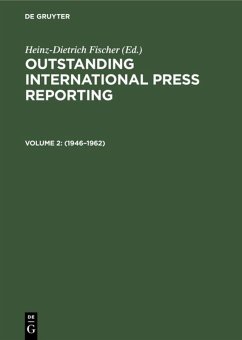1946-1962
From the end of World War II to the various stations of the Cold War
Mitwirkender: Fischer, Heinz-Dietrich
1946-1962
From the end of World War II to the various stations of the Cold War
Mitwirkender: Fischer, Heinz-Dietrich
- Gebundenes Buch
- Merkliste
- Auf die Merkliste
- Bewerten Bewerten
- Teilen
- Produkt teilen
- Produkterinnerung
- Produkterinnerung
OUTSTANDING INT. PRESS REP. VOL.2 (FISCHER) OIPR
Andere Kunden interessierten sich auch für
![1928-1945 1928-1945]() 1928-194589,99 €
1928-194589,99 €![1963-1977 1963-1977]() 1963-197782,99 €
1963-197782,99 €![1978-1989 1978-1989]() 1978-198988,99 €
1978-198988,99 €![Shelby Foote and the Art of History Shelby Foote and the Art of History]() James PanabakerShelby Foote and the Art of History34,99 €
James PanabakerShelby Foote and the Art of History34,99 €!['Authentic' Knight Identities and 'Ideal' Depictions of Chivalry between c.1350- c.1410 in France 'Authentic' Knight Identities and 'Ideal' Depictions of Chivalry between c.1350- c.1410 in France]() Georgia Parkes-Russell'Authentic' Knight Identities and 'Ideal' Depictions of Chivalry between c.1350- c.1410 in France47,95 €
Georgia Parkes-Russell'Authentic' Knight Identities and 'Ideal' Depictions of Chivalry between c.1350- c.1410 in France47,95 €![Das zwanzigste Jahrhundert Das zwanzigste Jahrhundert]() Bruno MarkwardtDas zwanzigste Jahrhundert294,95 €
Bruno MarkwardtDas zwanzigste Jahrhundert294,95 €![Die Figur des Enthusiasten in der amerikanischen Erzählliteratur Die Figur des Enthusiasten in der amerikanischen Erzählliteratur]() Hans-Jürgen WeckermannDie Figur des Enthusiasten in der amerikanischen Erzählliteratur109,95 €
Hans-Jürgen WeckermannDie Figur des Enthusiasten in der amerikanischen Erzählliteratur109,95 €-
-
-
OUTSTANDING INT. PRESS REP. VOL.2 (FISCHER) OIPR
Hinweis: Dieser Artikel kann nur an eine deutsche Lieferadresse ausgeliefert werden.
Hinweis: Dieser Artikel kann nur an eine deutsche Lieferadresse ausgeliefert werden.
Produktdetails
- Produktdetails
- Verlag: De Gruyter
- Reprint 2019
- Seitenzahl: 376
- Erscheinungstermin: 1. Mai 1985
- Englisch
- Abmessung: 246mm x 175mm x 26mm
- Gewicht: 812g
- ISBN-13: 9783110098242
- ISBN-10: 3110098245
- Artikelnr.: 26947637
- Herstellerkennzeichnung
- de Gruyter Mouton
- Genthiner Straße 13
- 10785 Berlin
- productsafety@degruyterbrill.com
- Verlag: De Gruyter
- Reprint 2019
- Seitenzahl: 376
- Erscheinungstermin: 1. Mai 1985
- Englisch
- Abmessung: 246mm x 175mm x 26mm
- Gewicht: 812g
- ISBN-13: 9783110098242
- ISBN-10: 3110098245
- Artikelnr.: 26947637
- Herstellerkennzeichnung
- de Gruyter Mouton
- Genthiner Straße 13
- 10785 Berlin
- productsafety@degruyterbrill.com
Frontmatter -- PREFACE -- CONTENTS -- Contents of Past Volume -- Contents of Future Volumes -- Introduction: The Pulitzer Prizes for International Reporting in the Second Phase of Their Development, 1946-1962 -- Editorial Remarks -- Prizewinners and Their Articles -- Chapter 19. REPORTS ABOUT THE SOVIET UNION IN 1946 -- The Post-War Situation and Some Typical Characteristics of the Country -- Chapter 20. REPORTS ABOUT THE SOVIET UNION IN 1947 -- The Cultural Situation and How It Is Formed by the Party -- Chapter 21. REPORTS ABOUT INDIA IN 1948 -- The Country's Way to Sovereignty and the Cultural Impediments -- Chapter 22. REPORTS ABOUT THE SOVIET UNION IN 1949 -- The Structure of the Government and the Way It Acts on the People -- Chapter 23. REPORTS ABOUT KOREA IN 1950 -- America's Fight Against Communism and the Conquest of Seoul -- Chapter 24. REPORTS ABOUT KOREA IN 1951 -- The Final Stage of the War and the Conditions for Peace -- Chapter 25. REPORTS ABOUT CANADA IN 1952 -- The Country's Great Fortunes and How They are Exploited -- Chapter 26. REPORTS ABOUT KOREA IN 1953 -- The Front and How the Soldiers Face It -- Chapter 27. REPORTS ABOUT THE SOVIET UNION IN 1954 -- The Post-Stalin Era and Important Events Connected With His Death -- Chapter 28. REPORTS ABOUT THE SOVIET UNION IN 1955 -- Changes in the Leadership and Several Important Statements by Its Members -- Chapter 29. REPORTS ABOUT HUNGARY IN 1956 -- The Civil War and the Exposition of Communism -- Chapter 30 REPORTS ABOUT YUGOSLAVIA IN 1957 -- Tito's Brand of Communism and Quarrels With Moscow -- Chapter 31. REPORTS ABOUT CUBA IN 1958 -- The Batista Rule and Rumors About Revolution -- Chapter 32. REPORTS ABOUT POLAND IN 1959 -- The Gomulka Government and the Structure of the Warsaw Pact -- Chapter 33. REPORTS ABOUT THE CONGO IN 1960 -- A Period of Unrest and Lumumba's Struggle for Unity -- Chapter 34. REPORTS ABOUT THE SOVIET UNION IN 1961 -- Some Important Political Questions and How They Are Viewed in Communism -- Chapter 35. REPORTS ABOUT CUBA IN 1962 -- The Escalation of a Global Crisis and How It Was Managed in Washington -- Index
Frontmatter -- PREFACE -- CONTENTS -- Contents of Past Volume -- Contents of Future Volumes -- Introduction: The Pulitzer Prizes for International Reporting in the Second Phase of Their Development, 1946-1962 -- Editorial Remarks -- Prizewinners and Their Articles -- Chapter 19. REPORTS ABOUT THE SOVIET UNION IN 1946 -- The Post-War Situation and Some Typical Characteristics of the Country -- Chapter 20. REPORTS ABOUT THE SOVIET UNION IN 1947 -- The Cultural Situation and How It Is Formed by the Party -- Chapter 21. REPORTS ABOUT INDIA IN 1948 -- The Country's Way to Sovereignty and the Cultural Impediments -- Chapter 22. REPORTS ABOUT THE SOVIET UNION IN 1949 -- The Structure of the Government and the Way It Acts on the People -- Chapter 23. REPORTS ABOUT KOREA IN 1950 -- America's Fight Against Communism and the Conquest of Seoul -- Chapter 24. REPORTS ABOUT KOREA IN 1951 -- The Final Stage of the War and the Conditions for Peace -- Chapter 25. REPORTS ABOUT CANADA IN 1952 -- The Country's Great Fortunes and How They are Exploited -- Chapter 26. REPORTS ABOUT KOREA IN 1953 -- The Front and How the Soldiers Face It -- Chapter 27. REPORTS ABOUT THE SOVIET UNION IN 1954 -- The Post-Stalin Era and Important Events Connected With His Death -- Chapter 28. REPORTS ABOUT THE SOVIET UNION IN 1955 -- Changes in the Leadership and Several Important Statements by Its Members -- Chapter 29. REPORTS ABOUT HUNGARY IN 1956 -- The Civil War and the Exposition of Communism -- Chapter 30 REPORTS ABOUT YUGOSLAVIA IN 1957 -- Tito's Brand of Communism and Quarrels With Moscow -- Chapter 31. REPORTS ABOUT CUBA IN 1958 -- The Batista Rule and Rumors About Revolution -- Chapter 32. REPORTS ABOUT POLAND IN 1959 -- The Gomulka Government and the Structure of the Warsaw Pact -- Chapter 33. REPORTS ABOUT THE CONGO IN 1960 -- A Period of Unrest and Lumumba's Struggle for Unity -- Chapter 34. REPORTS ABOUT THE SOVIET UNION IN 1961 -- Some Important Political Questions and How They Are Viewed in Communism -- Chapter 35. REPORTS ABOUT CUBA IN 1962 -- The Escalation of a Global Crisis and How It Was Managed in Washington -- Index








